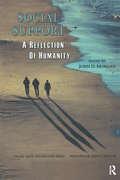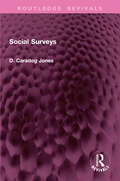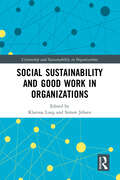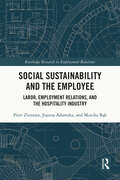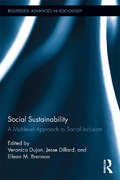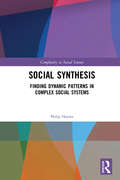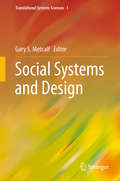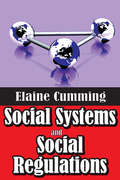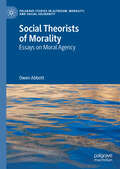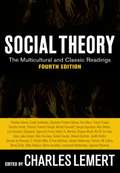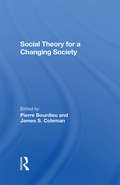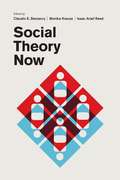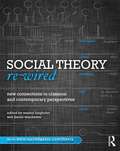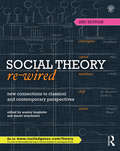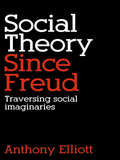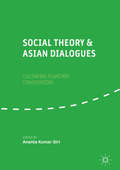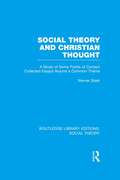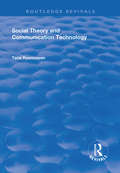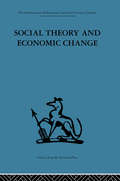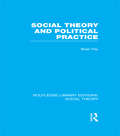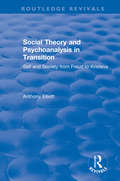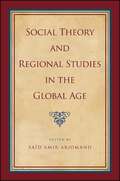- Table View
- List View
Social Support: A Reflection of Humanity (Death, Value and Meaning Series)
by John D. MorganNone of us could survive in the workplace, community, or even in our homes, if we allowed everyone to see how truly vulnerable we are. Yet, social support is a necessity if we are to achieve whatever it is we set out to achieve in this life. "No human being is an island unto himself." "Social Support: A Reflection of Humanity" is a "how to" book. In this work, the authors examine the nature of social support, how it can be offered, and how social support differs from other forms of therapy.
Social Surveys (Routledge Revivals)
by D. Caradog JonesSocial Surveys (1949) examines a host of fact-finding studies, dealing mainly with working class poverty, and the associated nature and problems. To describe the structure of a community demands a close study of the people who compose it, and of the environment in which they work and spend their free time, and the primary aim of a Social Survey is to make an accurate and impartial collection and presentation of facts.
Social Sustainability and Good Work in Organizations (Citizenship and Sustainability in Organizations)
by Klarissa Lueg Simon JebsenThis edited research monograph collects nine unique research contributions on the concept of social sustainability and its connection to possibilities and hindrances for good work in organisations. Social sustainability, in organisational contexts, emphasizes the long-term well-being of stakeholders and communities. The authors in this book demonstrate how organisational long-term strategies should prioritise employee well-being, mental health, community engagement, and ethical supply chain management, inter alia. Readers, from undergraduate students to the research community, will learn how long-term social sustainability orientation is different from Corporate Social Responsibility, which responds to immediate stakeholder expectations. The United Nations' Sustainable Development Goals have nudged many organisations to implement social sustainability, and many authors in this book relate to UN concepts such as the SDGs or Global Compact’s definition of social sustainability. However, many organisations have come under scrutiny for acting merely ceremonial to live up to the current megatrends. In consequence, readers will take away that the line between genuine corporate mission and ceremonial lip services must be critically observed, and how this can be done in different areas. Key chapters of this book explore social sustainability, e.g., in higher education (as sustainable knowledge in business students), in corporate communication (employee identification, corporate volunteering, and corporate heritage), and in sustainable human resource management practices. Workplace toxicity, especially towards minorities, is explored, highlighting both the role of bystanders, and the financial repercussions of ignoring workplace harassment. Digital transformation's social implications, employee well-being, and the importance of psychological safety in startups are addressed. The chapters, all together, signify the relevance of meaningful work for long-term societal cohesion and individual fulfilment.
Social Sustainability and the Employee: Labor, Employment Relations, and the Hospitality Industry (Routledge Research in Employment Relations)
by Piotr Zientara Joanna Adamska Monika BąkThis research monograph delves into the pressing issue of employee-centered social sustainability in the hospitality industry. Through empirical studies and content analysis of CSR reports, it highlights the significant challenges faced by frontline hospitality workers – such as low wages, job insecurity, limited union representation, and employer resistance to unionization.Offering a thorough, evidence-based examination, the monograph provides a comprehensive analysis of the employee dimension of social sustainability. It explores the critical role of organizational support, the fear of unionizing, and their impact on key outcomes like employee well-being and industry turnover intentions. The work also proposes a tailored framework for addressing employee needs at different stages of their careers, advancing the goal of "decent work" within the industry.Ideal for scholars and researchers in workforce studies, hospitality, and tourism, this volume offers valuable insights into the complex dynamics of labor practices and social sustainability. It serves as a vital resource for those seeking to foster employee-centered CSR initiatives. Policymakers, industry professionals, and advocates for improved labor conditions in hospitality will also find this book informative and thought-provoking, with actionable strategies for promoting social responsibility across the sector.
Social Sustainability: A Multilevel Approach to Social Inclusion (Routledge Advances in Sociology #101)
by Veronica Dujon Jesse Dillard Eileen M. BrennanHow can we raise the standard of living of the world’s poor and maintain high levels of social health and well-being in the developed world, while simultaneously reducing the environmental damage wrought by human activity? The social dimension of sustainability is becoming recognized as a necessary if not sufficient condition for attaining economic and environmental sustainability. The requisite dialogue requires inclusion at multi-levels. This collection of works is an ambitious and multi-disciplinary effort to indemnify and articulate the design, implementation and implications of inclusion. Included are theoretical and empirical pieces that examine the related issues at the local, national and international levels. Contributors are grounded in Sociology, Economics, Business Administration, Public Administration, Public Health, Psychology, Anthropology, Social Work, Education, and Natural Resource Management.
Social Synthesis: Finding Dynamic Patterns in Complex Social Systems (Complexity in Social Science)
by Philip HaynesHow is it possible to understand society and the problems it faces? What sense can be made of the behaviour of markets and government interventions? How can citizens understand the course that their lives take and the opportunities available to them? There has been much debate surrounding what methodology and methods are appropriate for social science research. In a larger sense, there have been differences in quantitative and qualitative approaches and some attempts to combine them. In addition, there have also been questions of the influence of competing values on all social activities versus the need to find an objective understanding. Thus, this aptly named volume strives to develop new methods through the practice of ‘social synthesis’, describing a methodology that perceives societies and economies as manifestations of highly dynamic, interactive and emergent complex systems. Furthermore, helping us to understand that an analysis of parts alone does not always lead to an informed understanding, Haynes presents to the contemporary researcher an original tool called Dynamic Pattern Synthesis (DPS) – a rigorous method that informs us about how specific complex social and economic systems adapt over time. A timely and significant monograph, Social Synthesis will appeal to advanced undergraduate and postgraduate students, research professionals and academic researchers informed by sociology, economics, politics, public policy, social policy and social psychology.
Social Systems and Design
by Gary S. MetcalfWe live in the worlds that we help to create every day. Every activity either supports an existing system or effects some change, however small. But is it possible to consciously create the worlds in which we want to live? This volume brings together systems theorists and practitioners who have worked on that question for decades. It explores connections between design and systems ideas to explain why some efforts have been more successful than others, and what is needed if we are to move forward. It offers reflections on early and large-scale attempts at impacting societal systems, as well as proposals for taking those ideas into the future. Examples date back to the Club of Rome in the 1960s and look forward to the creation of ecologically sustainable systems in the future. They address the need for collaboration and inclusion in settings from communities to corporations. And while theories are presented as support for the examples, they are explained in practical ways meant to be accessible both to students and to general readers.
Social Systems and Social Regulations
by Elaine CummingIn Social Systems and Social Regulations, Elaine Cumming describes attitudes of patients and clients toward health and welfare organizations. The focus is on the complex relationships between regulative agents, as revealed by the movement of clients through health and welfare systems. The author observes how doctors, clergy members, police officers, welfare officers, psychiatrists, social workers, and other social agents relate to one another and to their clients and charges.Cumming selected Syracuse, New York, typical of many middle-sized American cities of the 1960s, for her field studies. These involved several agencies and thousands of individuals. The result is a thoughtful analysis that can readily be applied to many aspects of the entire social system. Who are the clients? What are their problems? How do agents respond to them? These are some of the topics dealt with at length.From the view point of the agents, the author discusses how they see their own roles in the overall regulative system; how areas of operation interact and overlap; how the network of agencies changed over a five year period; what major problems remained to be overcome at the time; and what changes could and should have been made. When initially published, this was a new examination of the regulative system in America. Students and scholars will still find this work invaluable in the study of social control. Professionals will find many points for contrast and comparison and an analytical framework for evaluating and solving problems faced in health and welfare operations throughout the country.
Social Theorists of Morality: Essays on Moral Agency (Palgrave Studies in Altruism, Morality, and Social Solidarity)
by Owen AbbottThis book provides an interdisciplinary series of essays on key social theorists of morality. It explores contributions to social moral theorising made by W. E. B. Du Bois, G. H. Mead, Jane Addams, Alasdair MacIntyre, Carol Gilligan, Seyla Benhabib, Kwame Anthony Appiah, and Jonathan Haidt. It thus seeks to integrate alternative voices at the “foundations” of sociological theorising about morality, while entering into dialogues with post-Enlightenment moral philosophy and contemporary moral psychology. In so doing, it engages with perspectives of pragmatism, virtue ethics, care ethics, feminist critiques, and moral foundations theory. The essays discuss key topics in social theories of morality, including moral action, socialisation, habit and reflexiveness, relationships, emotion, self, identity, racism and colonialism, universalism, and innateness. It centres crucial (but often overlooked) questions of moral power, and assesses the relationship between moral theorising and normative argument. The essays are conjoined by a running theme of moral agency—how it is constituted and how it is enacted—which orientates the book’s arguments and critiques.
Social Theory
by Alex Skinner Wolfgang Knöbl Hans Joas Hans Joas Wolfgang KnöblRising concerns among scholars about the intellectual and cultural foundations of democracy have led to a revival of interest in the American philosophical tradition of pragmatism. In this book, Hans Joas shows how pragmatism can link divergent intellectual efforts to understand the social contexts of human knowledge, individual freedom, and democratic culture. Along with pragmatism's impact on American sociology and social research from 1895 to the 1940s, Joas traces its reception by French and German traditions during this century. He explores the influences of pragmatism—often misunderstood—on Emile Durkheim's sociology of knowledge, and on German thought, with particularly enlightening references to its appropriation by Nazism and its rejection by neo-Marxism. He also explores new currents of social theory in the work of Habermas, Castoriadis, Giddens, and Alexander, fashioning a bridge between Continental thought, American philosophy, and contemporary sociology; he shows how the misapprehension and neglect of pragmatism has led to systematic deficiencies in contemporary social theory. From this skillful historical and theoretical analysis, Joas creates a powerful case for the enduring legacy of Peirce, James, Dewey, and Mead for social theorists today.
Social Theory
by Charles LemertThis first truly multicultural anthology collects important, readable texts representative of the full range of social theory from the nineteenth century to the present. Now that social theory is practiced in many disciplines, it is necessary to reflect on the variety of theories being read today and the earlier sources that are customarily neglected. If today we read Donna Haraway, Henry Louis Gates, and Michel Foucault, we should also read and understand Charlotte Perkins Gilman and W.E.B. Du Bois, alongside Max Weber, Georg Simmel, William James, and others from the end of the nineteenth century. This book, therefore, sets a wider gauge for the understanding of the history of social thought than could have been possible before. It brings together theories in unexpected and exciting ways: those of Talcott Parsons and Dorothy Smith, Robert K. Merton and Jacques Lacan, Immanuel Wallerstein and Frantz Fanon, James Coleman and Molefi Asante. Extensive introductory essays by the editor situate the readings in their historical place and time, identifying the currents of social change that shaped fundamental questions of modern and postmodern life. This fourth edition has been thoroughly revised and updated to include cutting-edge documents on teletechnologies, masculinities, rhizomes, bare life, and more.
Social Theory
by Charles LemertThis book aims to productively engage the pioneering work of Queer theorists and point toe way towards a new sociological Queer studies. First book to bring the works of theorists and researchers in the social sciences to Queer theory which is distinctively dominated by the Humanities. Uses classic sociological essays that shaped lesbian, gay and bisexual studies and recent original works and applies these to the discursive approach of Queer Theory to create a productive dialogue between the disciplines.
Social Theory For A Changing Society
by Pierre Bourdieu James S. Coleman Zdzislawa Walaszek Coleman"There is in modem society a structural change that underlies many of the social changes with which the conference was concerned. My argument here will be that this is a qualitative change in the way society is organized, a change with many implications. I will call this a change from primordial and spontaneous social organization to constructed social organization (see Coleman 1990, Chapters 2, 3, and 24 for an extended examination of this change). The common definitions of these terms contain some hint of what I mean, but I will describe the change more fully to ensure that it is clearly understood. By primordial social organization I mean social organization that has its origins in the relationships established by childbirth. Not all these relations are activated in all cultures, but some subset of these relations forms the basis for all primitive and traditional social organization. From these relations, more complex structures unfold. For example, from these relations come families; from families come clans; from clans, villages; and from villages, tribes, ethnicities, or societies."
Social Theory Now
by Monika Krause Isaac Ariail Reed Claudio E. Benzecry, Isaac Ariail Reed, and Monika KrauseThe landscape of social theory has changed significantly over the three decades since the publication of Anthony Giddens and Jonathan Turner’s seminal Social Theory Today. Sociologists in the twenty-first century desperately need a new agenda centered around central questions of social theory. In Social Theory Now, Claudio E. Benzecry, Monika Krause, and Isaac Ariail Reed set a new course for sociologists, bringing together contributions from the most distinctive?sociological?traditions?in an ambitious survey of where social theory is today and where it might be going. The book?provides a strategic window onto social theory based on current research, examining trends in classical traditions and the cutting edge of more recent approaches. From distinctive theoretical positions, contributors address questions about?how social order is accomplished; the role of materiality, practice, and meaning; as well as the conditions for the knowledge of the social world. The theoretical traditions presented include cultural sociology, microsociologies, world-system theory and post-colonial theory, gender and feminism, actor network and network theory, systems theory, field theory, rational choice, poststructuralism, pragmatism, and the sociology of conventions. Each chapter introduces a tradition and presents an agenda for further theoretical development. Social Theory Now is an essential tool for sociologists. It will be central to the discussion and teaching of contemporary social theory?for years to come.
Social Theory Re-Wired
by Daniel Winchester Wesley LonghoferThis social theory text combines the structure of a print reader with the flexibility of an interactive website. The reader includes original texts from classical and contemporary theorists as well as short synopses of key ideas and brief biographies of each theorist. The website will contain a wide variety of innovative material that the instructor can use to tailor his or her social theory course, including videos and animations; discussion forums with webcam capabilities; commentaries and summaries of key concepts, including extended historical content; exams and quizzes; annotated selections from key readings; classroom activities and links to supplemental texts. The combination of a print reader and a modular online component will appeal to instructors looking to move parts of their course online or instructors already teaching in an online setting.
Social Theory Re-Wired: New Connections to Classical and Contemporary Perspectives (Sociology Re-Wired)
by Daniel Winchester Wesley LonghoferThis third edition of Social Theory Re-Wired is a significantly revised edition of this leading text and its unique web learning interactive programs that "allow us to go farther into theory and to build student skills than ever before," according to many teachers. Vital political and social updates are reflected both in the text and the online supplements. "System updates" to each section offer an expanded set of contemporary theory readings that focus on the impacts of information/digital technologies on each of the text’s five big themes: 1) the Puzzles of Social Order, 2) the Social Consequences of Capitalism, 3) the Darkside of Modernity, 4) Subordinated/Alternative Knowledges, and 5) Self-Identity and Society. New to this edition: The "big ideas/questions" thematic structure of the text as well as the connections between classical and contemporary theorists continues to be popular with instructors. This feature is enhanced in the new edition. An expanded "Podcast Companions" series now pairs at least one podcast to every reading in the book. Many new updates to the exercise platform allow students to theorize and build theory on their own. New readings excerpts include such important recent work as: Shoshana Zuboff’s "The Age of Surveillance Capitalism," Ruha Benjamin’s "Race After Technology," David Graeber’s "Of Flying Cars and the Declining Rate of Profit," Sherry Turkle’s “Always-On/Always-on-You.”
Social Theory Re-Wired: New Connections to Classical and Contemporary Perspectives (Sociology Re-Wired)
by Wesley Longhofer and Daniel WinchesterThis social theory text combines the structure of a print reader with the ability to tailor the course via an extensive interactive website. Readings from important classical and contemporary theorists are placed in conversation with one another through core themes—the puzzle of social order, the dark side of modernity, identity, etc. The website includes videos, interactive commentaries, summaries of key concepts, exams and quizzes, annotated selections from key readings, classroom activities, and more. See the website at www.routledgesoc.com/theory New to the second edition: Expanded web content. Teacher/student feedback employed to clarify difficult concepts. Reframed contemporary section now offers readings by Robert Merton, Bruno Latour, David Harvey, Zygmut Bauman, and Anthony Giddens.
Social Theory Since Freud: Traversing Social Imaginaries
by Anthony ElliottIn this compelling book, Anthony Elliott traces the rise of psychoanalysis from the Frankfurt School to postmodernism. Examining how pathbreaking theorists such as Adorno, Marcuse, Lacan and Lyotard have deployed psychoanalysis to politicise issues such as desire, sexuality, repression and identity, Elliott assesses the gains and losses arising from this appropriation of psychoanalysis in social theory and cultural studies.Moving from the impact of the Culture Wars and recent Freud-bashing to contemporary debates in social theory, feminism and postmodernism, Elliott argues for a new alliance between sociological and psychoanalytic perspectives.
Social Theory and Asian Dialogues: Cultivating Planetary Conversations
by Ananta Kumar GiriCritically exploring the presuppositions of contemporary social theory, this collection argues for a trans-civilizational dialogue and a deepening of the universe of intellectual discourse in order to transform sociology into a truly planetary conversation on the human condition. Focusing on perspectives from Asia, notably East Asia and India, it interrogates presuppositions in contemporary critical social theory about man, culture and society, and considers central themes such as knowledge and power, knowledge and liberation. The diverse contributions tackle key questions such the globalization of social theory, identity and society in east asia, as well as issues such as biopolitics, social welfare and eurocentrism. They also examine dialogues along multiple trajectories between social theorists from the Euro-American world and from the Asian universe, such as between Kant and Gandhi, Habermas and Sri Aurobindo, the Bildung tradition in Europe and the Confucian traditions. Arguing for a global comparative engagement and cross-cultural dialogue, this is a key read for all those interested in the future of social theory in the wake of globalization and the rise of the global south.
Social Theory and Christian Thought: A study of some points of contact. Collected essays around a central theme (Routledge Library Editions: Social Theory)
by Werner StarkAlmost all the great religious thinkers of the past have developed a social as well as theological doctrine, but their sociology was as a rule merely implicit in their work or at best half formulated so that careful study and analysis is needed to bring it out. This is the task which Dr. Stark has set himself in the present essays. He has searched the writings of St. Augustine, Paschal, Newman and Kierkegaard for the sociological ideas they contain and shows that their social philosophies were varied, profound, fascinating and surprisingly definite. Dr. Stark seeks the theological conceptions present in, and basic to, the teachings of some outstanding secular sociologists, economists and philosophers, such as Adam Smith, Kant, Hegel, Marx, the Darwinians, Bergson Scheler and Meinecke and proves that their systems were built around a religious centre even though they themselves were at times unaware of it.
Social Theory and Communication Technology (Routledge Revivals)
by Terje RasmussenThis title was first published in 2001. An investigation of new forms of interaction and communication. The essays address theoretical contributions and insights which may assist us in the understanding of modern society inhabited by a wide range of new media.In order to answer questions on this subject, the text suggests a "structural hermeneutic" - a view on the public as agents embedded in their lifeworlds (rather than as consumers and receivers), who play a large part in reproducing structural and distanciated processes of meaning. The essays explore the implications of such daily practices as making a telephone call or sending an email, receiving money from a bank machine using a credit card, or retrieving information from a Web site. Each of these practices reproduce patterns of information and communication practices, which reshape communication processes in society. The essays examine the relationship between media change and social change, with particular emphasis on their contribution to social interaction in everyday life and in the reproduction of social systems.
Social Theory and Economic Change
by Tom Burns S B SaulTavistock Press was established as a co-operative venture between the Tavistock Institute and Routledge & Kegan Paul (RKP) in the 1950s to produce a series of major contributions across the social sciences. This volume is part of a 2001 reissue of a selection of those important works which have since gone out of print, or are difficult to locate. Published by Routledge, 112 volumes in total are being brought together under the name The International Behavioural and Social Sciences Library: Classics from the Tavistock Press. Reproduced here in facsimile, this volume was originally published in 1967 and is available individually. The collection is also available in a number of themed mini-sets of between 5 and 13 volumes, or as a complete collection.
Social Theory and Political Practice (Routledge Library Editions: Social Theory)
by Brian FayThis book examines the question of how our knowledge of social life affects, and ought to affect, our way of living it. In so doing, it critically discusses two epistemological models of social science – the positivist and the interpretive – from the viewpoint of the political theories which, it is argued, are implicit in these models; moreover, it proposes a third model – the critical – which is organised around an explicit account of the relation between social theory and practical life. The book has the special merit of being a good overview of the principal current ideas about the relation between social theory and political practice, as well as an attempt at providing a new and more satisfactory account of this relationship. To accomplish this task, it synthesises work from the analytic philosophy of social science with that of the neo-Marxism of the Frankfurt school.
Social Theory and Psychoanalysis in Transition: Self and Society from Freud to Kristeva (Routledge Revivals: Anthony Elliott: Early Works in Social Theory)
by Anthony ElliottOriginally published in 1999 Social Theory and Psychoanalysis in Transition is a benchmark critique of Freudian theory in which a dialogue between the Frankfurt School, the Lacanian tradition and post-Lacanian developments in critical and feminist theory is developed. Considering afresh the relations between self and society, Elliot argues for the importance of imagination and the unconscious in understanding issues about the self and self-identity, ideology and power, sexual difference and gender.
Social Theory and Regional Studies in the Global Age (SUNY series, Pangaea II: Global/Local Studies)
by Saïd Amir ArjomandIn this pioneering volume, leading international scholars argue for the development of a new approach to social theory that draws on regional studies for the conduct of comparative analysis in the global age. Social Theory and Regional Studies in the Global Age moves beyond facile generalizations based on the historical experience of modernization in the West by highlighting differences rather than similarities and contrasts rather than commonalities, and by examining civilizational processes and culturally specific developmental patterns distinctive of different world regions. Essays combine comparative and historical sociology with civilizational analysis and the study of multiple and alternative modernities. Different patterns of modernization are compared within the framework of global/local compressed communication and interaction that results from globalization. The introductory chapter puts the present effort in the context of the seminal work of three generations of comparative sociologists, and what follows is a penetrating analysis of modernization and globality, opening the way for rectifying the erasure of the historical experience of a very sizeable portion of humankind from the foundation of social theory.
